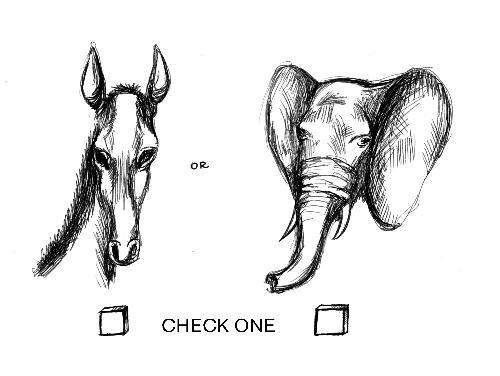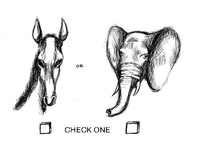Tomorrow, America will experience the election that wasn’t. The campaign season which should have been the time for all candidates to offer innovative solutions for social security, education and homeland security has instead fallen victim to a cosmetic partisanship and mud-slinging that leaves voters alienated and candidates indistinguishable.
If we’re to believe the Democratic rag, every Republican must be in cahoots with big business and trying to bankrupt the common man. If we choose to believe Republicans, every Democrat is standing in the way of national security, taking away from the president’s ability to lead our nation in a time of crisis. Each claim is equally bogus, but worse than the inaccuracy is what such a one-tune rhetoric has resulted in: a slate of cookie-cutter candidates who are not individuals but mere members of their political parties.
The parties know how to run successful campaigns. It’s not by increasing a candidate’s name recognition and convincing the voter constituency that he’s a good guy. Those take a lot of money; even in this age of soft money, it takes a lot more capital than most candidates have.
Enter attack ads. The main party line attacks are well represented by the attack ads in this year’s major races. Take, for example, the typical Republican ad. In Georgia, Republican candidate for Senate Saxby Chambliss ran ads flashing pictures of Osama bin Laden and Saddam Hussein before snapshots of incumbent Sen. Max Cleland to demonstrate how Cleland hasn’t been supportive enough of the Bush administration’s national security policy. It would be hard for most to understand how attacking Cleland, who is a well-respected war hero who lost both legs and an arm in Vietnam, would win Chambliss points in military-oriented Georgia. Nevertheless, since Chambliss has been on attack mode, he has been steadily closing the poll gap. Across the isle, Democrats across the nation have run similar ads trying to scare senior citizens into believing that Republicans wish to dismantle Medicare and Social Security.
The targets of attack ads have a defensive recourse. To rebut a claim that he is not supportive of the president, a senator will likely point to the recent vote on the Iraq resolution—which every senator running for reelection voted to pass, with the exception of the late Sen. Paul Wellstone—as an example of standing with the president on national security. In fact, some Democratic candidates have gone to great lengths to compare themselves to Bush, like Ron Kirk, a Texas Democrat running for Senate, whose campaign machine has ceaselessly churned out press releases talking about Kirk’s affection for the Texan president. Likewise, Republicans have been distancing themselves from now-unpopular notions like privatizing social security. In these cases, however, candidates has been generally evasive over what they believe and have instead relied on arousing public suspicions over the true beliefs of his opponent.
All in all, trying to find differences in this rather unsavory lot of candidates is quite frustrating. All of them love old people and would never think of privatizing social security. All of them agree with the president on war with Iraq. It’s a small wonder why voters are apathetic when each candidate seems like a clone of the other. Indeed, the only visible difference is that one is a Republican and one is a Democrat.
It’s sad that the politics of Congress has devolved to the party line, and the candidates’ names have become irrelevant. Yet, in this campaign season’s orgy of collective identity, voters cannot possibly succeed in discerning which of the candidates is a better human being and policymaker. With both the House and the Senate up for grabs, if voters cannot bear to check the box next to the name of a mindless automaton pretending to be a thinking candidate, they should look instead to the emblem of the one, residual difference of this campaign season’s politics: the “R” and the “D.”















